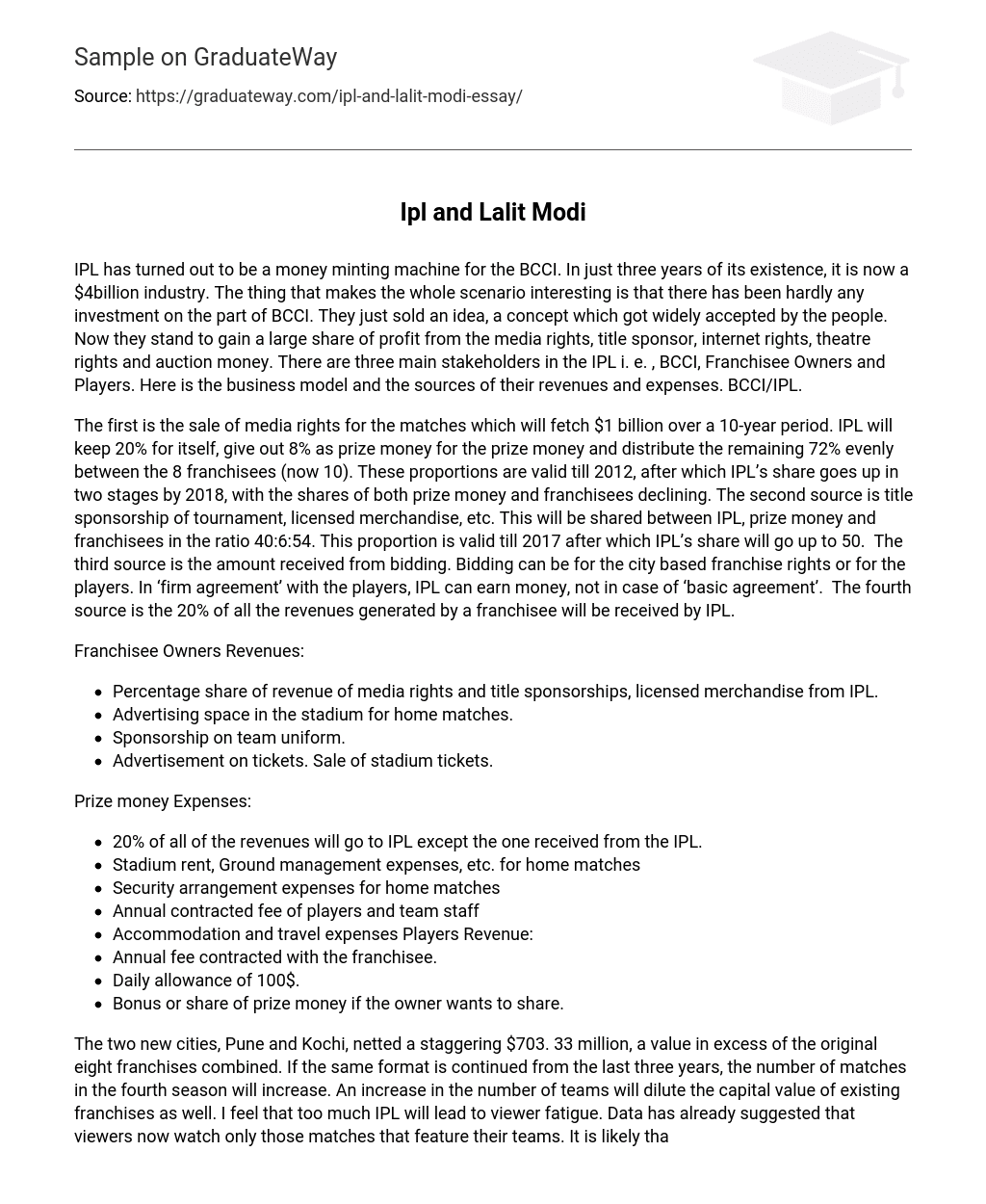IPL has turned out to be a money minting machine for the BCCI. In just three years of its existence, it is now a $4billion industry. The thing that makes the whole scenario interesting is that there has been hardly any investment on the part of BCCI. They just sold an idea, a concept which got widely accepted by the people. Now they stand to gain a large share of profit from the media rights, title sponsor, internet rights, theatre rights and auction money. There are three main stakeholders in the IPL i. e. , BCCI, Franchisee Owners and Players. Here is the business model and the sources of their revenues and expenses. BCCI/IPL.
The first is the sale of media rights for the matches which will fetch $1 billion over a 10-year period. IPL will keep 20% for itself, give out 8% as prize money for the prize money and distribute the remaining 72% evenly between the 8 franchisees (now 10). These proportions are valid till 2012, after which IPL’s share goes up in two stages by 2018, with the shares of both prize money and franchisees declining. The second source is title sponsorship of tournament, licensed merchandise, etc. This will be shared between IPL, prize money and franchisees in the ratio 40:6:54. This proportion is valid till 2017 after which IPL’s share will go up to 50. The third source is the amount received from bidding. Bidding can be for the city based franchise rights or for the players. In ‘firm agreement’ with the players, IPL can earn money, not in case of ‘basic agreement’. The fourth source is the 20% of all the revenues generated by a franchisee will be received by IPL.
Franchisee Owners Revenues:
- Percentage share of revenue of media rights and title sponsorships, licensed merchandise from IPL.
- Advertising space in the stadium for home matches.
- Sponsorship on team uniform.
- Advertisement on tickets. Sale of stadium tickets.
Prize money Expenses:
- 20% of all of the revenues will go to IPL except the one received from the IPL.
- Stadium rent, Ground management expenses, etc. for home matches
- Security arrangement expenses for home matches
- Annual contracted fee of players and team staff
- Accommodation and travel expenses Players Revenue:
- Annual fee contracted with the franchisee.
- Daily allowance of 100$.
- Bonus or share of prize money if the owner wants to share.
The two new cities, Pune and Kochi, netted a staggering $703. 33 million, a value in excess of the original eight franchises combined. If the same format is continued from the last three years, the number of matches in the fourth season will increase. An increase in the number of teams will dilute the capital value of existing franchises as well. I feel that too much IPL will lead to viewer fatigue. Data has already suggested that viewers now watch only those matches that feature their teams. It is likely that IPL may not keep getting new viewers, but existing viewers may be spread across more matches. Since broadcasting revenues are so critical to profitability, this is a risk the IPL management will have to grapple with.
I am convinced that the Pune and Kochi auctions will turn out to be classic examples of “winner’s curse”. The real winners from this auction will be the existing eight franchises, who can now leverage the latest price discovery to exit when the IPL bubble is peaking. Lalit Modi On a high, Lalit Modi made cricket a commercial sport. He realized the potential of T-20 cricket, studied its commercial viability, gave it a structure and presented IPL as an amalgamation of Cricket and Entertainment which attracted people and sponsors alike.
He brought innovation by telecasting matches in multiplexes and on YouTube which were huge success. When IPL could not be held in India in 2009 due to general elections, he conducted a successful edition in South Africa even when there was time constraint. He associated charity with IPL that also added to its brand value. Going by all these, he was a good manager who initiated IPL, managed it well, brought innovations and made it a huge success in just three years. But at the end of the third season, charges surfaced of him being the proxy owner of two franchisees, being involved in betting and money laundering.
He has been accused of siphoning money in the multimillion dollar deal with WSG. He has also been accused of favoritism with regard to the Kochi franchise. He was accused for tax evading and BCCI chairman suspended him as IPL chief because of behavioral problems. If these charges are true, it is unethical and such are not the characteristics of a good, socially responsible manager. This is a blot in what otherwise has been a great concept for IPL and for a person with impeccable management skills.





